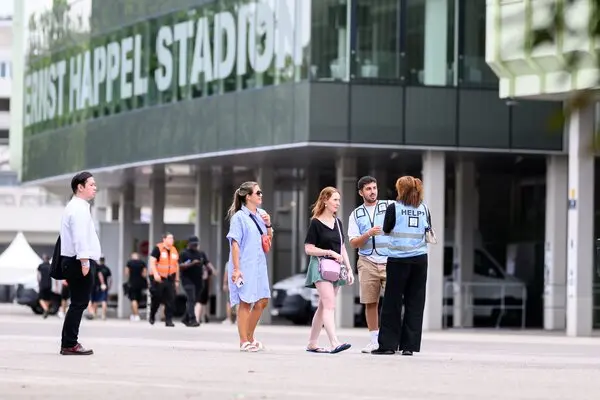A suspect confessed to a plot using explosives and other weapons to kill as many attendees as possible, security officials said. The singer’s three-concert Vienna run was canceled.
The youths accused of planning to attack a Taylor Swift concert in Vienna had hoped to kill as many people as possible, the Austrian authorities said on Thursday, outlining a plot designed to copy some of the worst terrorist assaults of the last decade.
“The suspects actually had very specific and detailed plans to cause a tragedy on the scale of Paris, Manchester or Moscow,” Karl Nehammer, the chancellor of Austria, said Thursday afternoon at a news conference, referring to attacks that killed hundreds of concertgoers in all. Mr. Nehammer said the two, arrested less than 24 hours earlier, wanted to leave a “trail of blood.”
Ms. Swift had scheduled three concerts in Vienna, the first on Thursday, and she had been expected to draw more than 200,000 fans from across the world. Barracuda Music, the promoter for the Vienna run, canceled the shows on Wednesday night in what it characterized as a decision coordinated with Ms. Swift’s management.
The Austrian authorities did not publicly identify either of the people arrested. They described the main suspect as a 19-year-old man who was radicalized online and swore an oath of allegiance to the Islamic State.
Franz Ruf, the head of public safety and Austria’s highest-ranking police officer, said at a news conference earlier on Thursday that the suspect had confessed to the terror plans after being arrested, providing detailed insight into his intentions, which included using explosives and weapons to kill attendees.
Searching the young man’s home in the town of Ternitz, about 40 miles south of Vienna, where he lived with his parents, the police found machetes, knives, explosives, timers and chemicals to make explosives, as well as steroids, Islamic State propaganda and 21,000 euros in counterfeit bills, Mr. Ruf said. The man had successfully fabricated bombs using instructions found online, the police said.
He did not have a ticket to any of the concerts. But the authorities found a police siren system, which they said could have allowed an attacker to enter or flee the site in a car.
When the suspect, who was born in Austria but has Macedonian roots, quit his job last month, he told colleagues he had big plans, according to investigators. He then changed his appearance, they said.
The tip that led to the arrests came from U.S. intelligence, according to U.S. officials. Omar Haijawi-Pirchner, the head of Austria’s domestic intelligence agency, acknowledged on Thursday that the tip had come from abroad but did not attribute American officials.
Concerts have been targets elsewhere in Europe in recent years. In 2015, gunmen attacked a concert venue in Paris, killing more than 90 people and wounding hundreds. In 2017, a suicide bombing at an Ariana Grande concert in Manchester, England, killed 22 people. And in March, gunmen attacked the Moscow concert, killing more than 140. Those assaults were carried out by men who were inspired by or linked to the Islamic State or its ISIS-K, an ambitious affiliate that has set its sights on attacking Europe.
Ms. Swift’s fans were also victims in England last week, when three girls were fatally stabbed during a Swift-themed dance class. A teenager was arrested in connection with the assault.
Next week, the singer’s global tour is scheduled to begin a run of five sold-out shows at Wembley Stadium, a 90,000-capacity arena in London.
Neither Wembley Stadium nor A.E.G. Presents, the promoter for the tour’s British dates, immediately responded to emails asking about how the events in Austria might affect those shows. But a spokesman for London’s Metropolitan Police said in a statement that there was “nothing to indicate that the matters being investigated by the Austrian authorities will have an impact on upcoming events here.”



